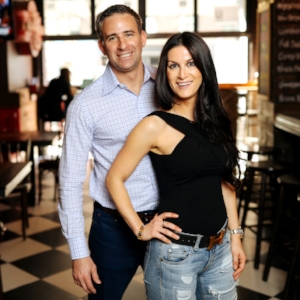Why You Don't Need to Be "Hot" to Be Effective
By now many of us have had the misfortune of reading the New York Post article, "Why I Don't Date Hot Women Anymore" (and perhaps also the Jezebel rebuttal). For those of you who escaped it, a quick recap: Average looking 30-something NYC finance guy Dan used to date bikini models, but found them vapid and too uninteresting, so has now settled for a "merely beautiful" woman (see photo below). Yes, you read all of that correctly.

There are so many directions one could go from there....but let us use this as an opportunity to talk about appearance: why it matters and how to use it to your advantage.
I didn't create Sociology of Style to make people "hotter" or attract someone like Dan.
I created it to empower people to maximize the power of their image as a social (and psychological) tool. How we're perceived — and as a result, treated — is determined through a compilation of what we say, what we do, and how we appear. As a society, we have no problem focusing on the first two parts of that equation — we deem them worthy of our time and investment. But the third piece, appearance, is often written off (particularly by educated individuals) as mere frivolity. Superficial nonsense. Insignificant. And we often judge those who do invest in their appearance as vain or insecure.
But denying the importance of appearance doesn't make it go away. Nor does embracing it relegate you to the unsavory realm of Dan and his modelizing cohorts.
We are visual creatures. Understanding and perception are largely filtered through a visual lens. Knowing is a multi-sensory experience. It's not either/or. It's both/and.
One objection some critics have to an emphasis on appearance is that it is not "substantive." But I reject that categorization. The nuances of our appearance are bursting with significance. From the intentional visual statement (a clever combination of artifacts from different cultures and eras, tattoos, power clashing, a full beard) to the circumstancially and historically revealing (scars, tanned skin in winter, over-developed biceps from manual labor, a run in hosiery due to a morning mishap). It's not that any single one of these visual attributes singularly defines us — but to call them frivolous or insignificant is to deny part of our identity.
We are invited to witness each other and ourselves daily. That witnessing is powerful. And persuasive. Sometimes what we witness attracts us. Other times it confuses, or compels, or – all the things that occur when we come to know and experience another human being in a multi-dimensional way.
The goal of attending to your appearance is not to attract Dan. But it also isn't to repel him. It's to be effective.
You must appear — that part is not optional. But the message you send both to yourself and others is largely within your control. What is the persona you want to project? And how will it be received by your audience? Establishing image efficacy is a combination of What I Want/How I Feel + What My Audience Wants/Understands. Over-rely on either one of those and your situational efficacy wanes significantly. Find a balance and wear it proudly.
Take back the power from Dan not by minimizing appearance, but by consciously upping your image game to foster connection and spotlight your substance.
Remember: To appear is powerful. Make the most of it.
Yours,
Anna
p.s. Tell me how you use your image to connect and communicate. What's your image formula for social success?